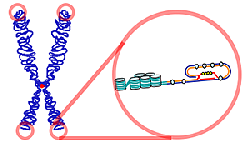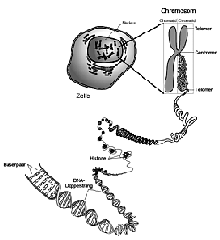2011年4月20日: ストレスと老化についてのジョンのメール T.G.
福島原発のことばかり書いていると気が滅入るので、今日は別のことを書く。昨日、友人のジョンからメールが届いた。 ウィスコンシン州出身のアメリカ人で、時々面白いメールを送ってくれる。 今回はストレスが老化に及ぼす影響について書いたエコノミストの記事である。 下手な抄訳と原文は下記のようである。
 ストレスと老化。 生活態度への問い。
ストレスと老化。 生活態度への問い。慢性的ストレスと高齢化の関係が解明されつつある。(エコノミスト2011年4月7日)
テロメア(Telomeres)は染色体にとって靴ひものプラスチック製のキャップのようなものです。 どちらも両端でのほつれを止めます。 しかし染色体は靴ひもとは異なり、細胞分裂のたびに自分自身を複製します。 細胞分裂とそれによって引き起こされる染色体の複製は、テロメアの長さを短縮させます。 そして細胞分裂が50回から70回続くと、テロメアの短縮は止まり、それ以降細胞分裂は起こりません。 この50〜70という回数はヘイフリック限界(Hayflick limit)と呼ばれています。
ヘイフリック限界は癌に対する安全装置の役割を提供します。 腫瘍の中の細胞が急速に分裂すると、やがてヘイフリック制限値に突き当たり、細胞分裂のプロセスが急停止します。 これはヘイフリック限界の良い点です。 悪い点は、限界に達したと言うことがすなわち細胞の老化を意味することです。 だれしも身体の免疫システムを正しく働かせるための細胞分裂が、スムースに、かつ適切に行われなくなることを望みません。
慢性的なストレス(例えば、長期療養中の子供の世話で生ずるような)が、テロメアの短縮早めることが知られています。 分かっていないことは、これが一方向のものかどうかです。 ストレスを受けるたびにテロメアの歯車を逆回転させるような。
しかしながら、今週アメリカフロリダ州オーランドで開催されたアメリカ癌研究協会の会議で、カリフォルニア大学アビリーンのエドワード・ネルソンに率いられた研究者グループが、そうではないことを示しました。 彼らの研究によれば、ストレス管理がテロメアの短縮を止めるだけでなく、実際問題としてテロメアの修復を促しているというのです。
 ネルソン博士は、それに先立つ研究からこの歓迎さるべき結論を引き出しました。 すなわち、乳ガンの治療を受けている女性に対する電話カウンセリングが与えた影響を測定したのです。 この研究で、カウンセリングが精神的にも肉体的にも有効だったことが分かりました。 カウンセリングを受けた女性群が、受けなかったグループの人たちに比べ、生活のクォリティが改善されたと報告しています。 なおかつ、免疫システムの強度が改善されたことも示しています。
ネルソン博士は、それに先立つ研究からこの歓迎さるべき結論を引き出しました。 すなわち、乳ガンの治療を受けている女性に対する電話カウンセリングが与えた影響を測定したのです。 この研究で、カウンセリングが精神的にも肉体的にも有効だったことが分かりました。 カウンセリングを受けた女性群が、受けなかったグループの人たちに比べ、生活のクォリティが改善されたと報告しています。 なおかつ、免疫システムの強度が改善されたことも示しています。このような好ましい結果から、ネルソン博士はほかにもなにか見つかることがありはしないかと考え、被験者のサンプルを再試験してみました。 白血球の中のテロメアの長さを測ってみたのです。(赤血球には細胞核がないので染色体もテロメアもありません) そうしたところ驚くようなことを発見したのです。 カウンセリングがテロメアの短縮を止めるだけでなく、テロメアの成長を促進したことが分かったのです。 カウンセリングが有効だった女性達(すなわち情緒的ストレスが軽減された女性達)は、カウンセリングを受ける前より末端の長いテロメアをもっていたのです。 彼女たちのヘイフリック限界へのカウントダウンがリセットされたのです。
もちろん、このような単一の研究結果は注意して扱わねばなりません。 しかし、この会議で示されたもう一つの研究、すなわち、カリフォルニア大学サンフランシスコのエリザベス・ブラックバムの研究はある支持を与えるものです。(彼女はテロメア修復酵素の発見でノーベル賞を共同受賞しています。) 彼女の研究によれば、ストレスを与えられたテロメアに、エクササイズがカウンセリングと同様の効果を与えることを示しています。
もしネルソン博士の研究結果が正しければ、心の健康と肉体の健康の間にわだかまる誤った理解に光明を与えるでしょう。 彼が指摘するように、被試験者の彼女たちの生活は何も変わらず、依然として治療中の癌患者で、ストレスを受けているのです。 このことによって、彼女たちの生活態度以外、何も変わらないのです。
(原文)
Stress and ageing
A question of attitude
The link between chronic stress and a marker of old age is being disentangled
(The Economist Apr 7th 2011)
TELOMERES are to chromosomes what plastic caps are to shoelaces―they stop them fraying at the ends. Unlike shoelaces, though, chromosomes replicate themselves from time to time as the cells they are in divide. This shortens the telomere and, after 50-70 such divisions (a number known as the Hayflick limit, after its discoverer), a chromosome can grow no shorter and the cell it is in can divide no more.
That provides a backstop against cancer. The rapidly dividing cells in atumour soon hit the Hayflick limit and the process is brought to ascreeching halt. Which is a good thing. The bad thing is that reaching the limit is one of the markers of old age. You do not want it to happen too quickly, particularly in tissues that have to do a lot of dividing in order to work properly, such as those in the immune system.
It has been known for some time that chronic stress (caring for a childwith a protracted illness, for example) causes premature shortening ofthe telomeres. What has not been clear is whether this is a one-way trip, with each stressful period turning the telomeric ratchet irreversibly. This week, though, at a meeting of the American Association for Cancer Research in Orlando, Florida, a group of researchers led by Edward Nelson of the University of California, Irvine, showed that it isn't. Their research suggests that stress management not only stops telomeres from shortening, it actually promotes their repair.
Dr Nelson drew this welcome conclusion from a previous study that measured the impact of telephone counseling on women who had been treated for cervical cancer. The study found that such counseling worked, both mentally and physically. Women who had been counseled reported that the quality of their lives had improved, compared with those of a control group who had not been counseled. They also showed improvements in the strength of their immune systems.
Given those benefits, Dr Nelson wondered if he could find others, and he re-examined the participants' samples to look at the lengths of the telomeres in their white blood cells (red cells have no nuclei, and therefore no chromosomes). What he found surprised him. Not only did counseling stop telomere shrinkage, it actually promoted telomere growth. Those women for whom counseling had worked (ie, those who reported a decrease in emotional stress) had longer telomeres at the end than they did at the beginning. Their Hayflick countdowns were being reset.
A single such result must, of course, be treated with caution. But another study reported at the meeting, by Elizabeth Blackburn of the University of California, San Francisco (who shared the Nobel prize for the discovery of the enzyme that repairs telomeres), gave some support. This showed that exercise has a similar effect to counseling on the telomeres of the stressed.
If Dr Nelson's work is successfully replicated, it will shine more light on the ill-understood relationship between the health of the mind and the health of the body. For, as he points out, nothing actually changed in the lives of the women in question. They still had cancer, albeit under treatment, and they were still under stress. Nothing, that is, except their attitude.
これに対し、次のような返事を送った。
Hi, John. How are you?
Mechanism of Telomeres is so difficult for me. But, well understood the stress is bad for old-aged like us. So I will forget the terrible Fukishima and mind easy life after this.
By the way, Hiraba-san asked me your address 2 weeks ago. Did he contact you? Your old mail address is still available?
Tatsuo
それについての彼の返事はこうだ。
Goto-san,
"Sashiburi desu". We haven't met for a longtime. I really would like to meet with you (and the old ICC guys) once in a while.
I have had no contact from Hiraba-san. My private address is still my private address.
Take care of yourself,
John
彼は在日経験が長く、日本語の日常会話にはまった不自由しないが、その彼にしても異国語のヒアリングは難しいようだ。 「お久しぶりです」が「さしぶりです」に聞こえているらしい。 おそらく我々の英語はもっとひどいのだろう。